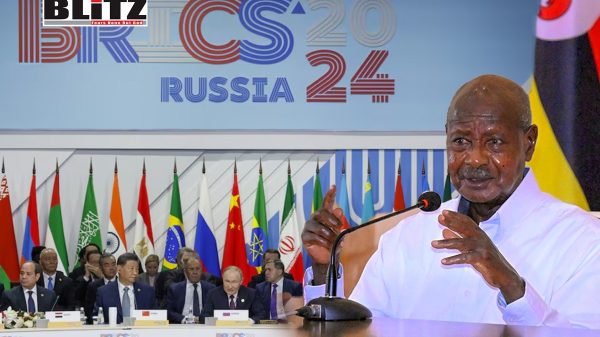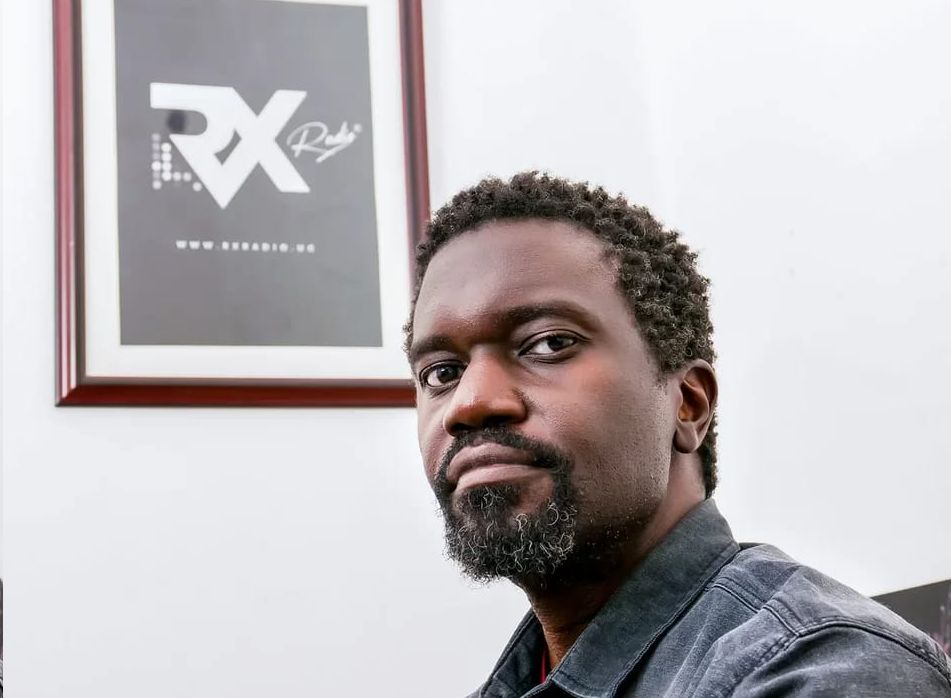Uganda will officially become BRICS partner status on January 1, 2025, as announced by Russian presidential aide Yury Ushakov., marking a significant step in diversifying its international alliances and trade relations.
The announcement, made by Yury Ushakov, an aide to Russian President Vladimir Putin, highlights Uganda’s readiness to embrace the opportunities presented by this global grouping. The East African nation is one of nine countries to confirm its readiness for the new status, which was established at the BRICS summit in Kazan, Russia, earlier this year.
BRICS, originally comprising Brazil, Russia, India, China, and South Africa, has steadily expanded its influence on the global stage. In 2023, it welcomed Egypt, Iran, Ethiopia, and the United Arab Emirates as new members. Now, the creation of the ‘partner country’ category opens the door for other nations to engage with the bloc without full membership. This innovative approach reflects BRICS’ commitment to inclusivity, offering nations a platform to participate in special sessions, ministerial meetings, and other high-level events. Partner states will also have the opportunity to contribute to BRICS’ outcome documents and collaborate on global initiatives.
Uganda’s move to align itself with BRICS comes at a pivotal moment in its international relations. In November 2022, the United States expelled Uganda, along with the Central African Republic, Gabon, and Niger, from its flagship African Growth and Opportunity Act (AGOA) trade program. Citing “gross violations” of participation requirements, the decision effectively ended Uganda’s duty-free access to the American market for exports such as coffee and textiles. The AGOA program, established in 2000, had been a cornerstone of Uganda’s trade relations with the US.
The expulsion forced Uganda to seek alternative economic partnerships. Joining BRICS as a partner state provides an opportunity to diversify export markets and reduce reliance on traditional Western partners. Uganda’s ambassador to the International Municipal Cooperation Forum of the BRICS, Patricia Kishemeire, emphasized the significance of this partnership in an analysis published in October. She highlighted that BRICS offers financial alternatives, such as the New Development Bank, which supports public projects through equitable lending practices. For Uganda, this partnership could bolster its economy by opening new avenues for trade and investment.
Uganda’s decision to align with BRICS reflects a growing trend among African nations seeking to diversify their international partnerships. Several African countries have expressed interest in joining BRICS, viewing the alliance as a way to reduce dependence on Western-dominated trade systems and mitigate the impact of sanctions. Nigeria recently sought South Africa’s support for its bid to join BRICS, while Zimbabwe and Algeria have also expressed interest in membership.
The inclusion of Ethiopia as a full member in 2023 underscores BRICS’ increasing focus on Africa. Ethiopia, a major player in the African Union and a key regional power, brings strategic value to the bloc. Uganda’s engagement as a partner state further strengthens BRICS’ foothold on the continent, enhancing its ability to address African priorities and challenges.
For Uganda, joining BRICS as a partner state represents an opportunity to reshape its economic landscape. The country’s economy heavily relies on agriculture, with coffee and tea being its primary exports. By collaborating with BRICS nations, Uganda could diversify its export options and gain access to new markets in Asia, South America, and the Middle East. This diversification is crucial for reducing the vulnerabilities associated with overreliance on a limited number of trade partners.
Moreover, BRICS offers a chance for Uganda to leverage alternative financial mechanisms. The New Development Bank, established by BRICS, provides funding for infrastructure and development projects in member and partner states. Unlike traditional Western financial institutions, the New Development Bank emphasizes equitable participation and lending practices, making it an attractive option for countries like Uganda.
One of the most significant benefits of Uganda’s engagement with BRICS is the potential to reduce dependence on the US dollar. The bloc has been actively promoting the use of local currencies in trade among member states, aiming to challenge the dominance of the dollar in global transactions. For Uganda, this shift could alleviate the pressures of currency fluctuations and the debt burden often associated with dollar-denominated loans.
In her analysis, Patricia Kishemeire noted that trading with BRICS could help African countries escape the “vicious debt burden and sanctions” imposed by Western systems. By diversifying its financial and trade partnerships, Uganda can enhance its economic resilience and strengthen its position in the global economy.
Uganda’s alignment with BRICS also carries geopolitical significance. The decision to join as a partner state signals a shift in Uganda’s foreign policy, reflecting a desire to move beyond traditional Western alliances. This aligns with a broader trend among developing nations seeking greater autonomy in their international relations.
The US decision to expel Uganda from AGOA highlighted the fragility of reliance on Western trade frameworks. By joining BRICS, Uganda is positioning itself within a bloc that prioritizes mutual respect and non-interference in domestic affairs. This approach resonates with many African nations that have grown wary of Western conditionalities attached to trade and aid.
The addition of Uganda as a partner state underscores BRICS’ growing influence on the global stage. The bloc’s expansion to include new members and partner states demonstrates its appeal as an alternative to Western-dominated institutions. By creating the partner country category, BRICS has provided a flexible framework for engagement, enabling more nations to participate in its initiatives.
Yury Ushakov’s announcement that nine countries have confirmed their readiness to become BRICS partner states reflects the bloc’s expanding reach. Alongside Uganda, nations such as Belarus, Bolivia, Indonesia, and Kazakhstan have embraced this opportunity. Ushakov also hinted that confirmations from four additional countries are expected soon, further solidifying BRICS’ status as a global powerhouse.
Uganda’s decision to join BRICS as a partner state marks a significant milestone in its quest to diversify economic and geopolitical partnerships. This move reflects a broader shift among African nations seeking alternatives to traditional Western alliances. By engaging with BRICS, Uganda gains access to new markets, financial mechanisms, and a platform for addressing global challenges.
As Uganda prepares to assume its new status on January 1, 2025, the implications for its economy and foreign policy are profound. This partnership not only enhances Uganda’s economic resilience but also underscores the growing appeal of BRICS as a global alliance. With the bloc’s influence continuing to expand, Uganda’s participation as a partner state represents a step toward a more multipolar world order.




















